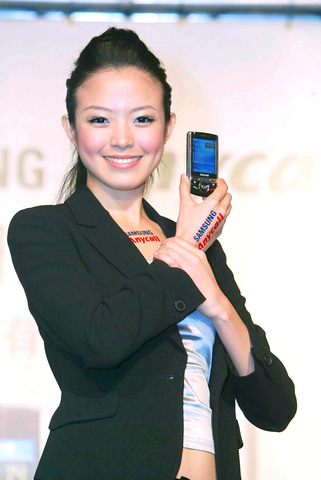Samsung Electronics Taiwan Co yesterday debuted its first PDA phone, the Samsung Anycall i718, to tap into Taiwan's underdeveloped PDA market with sleek features supported by the Windows operation system.
This marks the first time the South Korean consumer electronics maker has joined hands with Microsoft Corp to attract businessmen and businesswomen with an eye for fashion, the firm said.
Samsung claimed that the model, which runs Windows Mobile 5.0 and has a 2-megapixel camera, is the slimmest PDA phone in the world with a weight of 109g and a thickness of 13.5mm.

PHOTO: WANG YI-HUNG, TAIPEI TIMES
"Many people still don't want to use a PDA phone because they're not satisfied with the styles and the complex functions now seen on the market. They also want the prices to be more friendly," said Scott Huang (黃思齊), vice president of Samsung's mobile communication department, at the product launch.
Samsung highlights the most useful features in the new product -- Microsoft Office applications including a calendar and e-mail -- for PDA users and provides an easy way to switch between the cellphone and Windows interfaces on its touch screen to simplify operation, he said.
The phone will retail at a competitive price of NT$14,800 (US$447), which will include a complete set of accessories including two batteries, which Huang said would effectively help the i718 gain market share.
The firm expects the i718 to compete head-on with the popular Motorola "Ming" and Dopod 818 Pro.
Huang said that Taiwan's market is expected to see 7.2 million cellphones sold this year, up from last year's 7 million units.
The PDA phone market should more than double from last year's 2 percent of overall cellphones purchased to an estimated 5 percent this year, he said.
"Taiwanese user demand for PDA phones is growing and with the debut of i718, Samsung will launch a series of PDA and smartphones this year," said Ryu Jae-hyun, director of Samsung's mobile communication department.
The company will introduce a smartphone in the second quarter and fine-tune its strategy for the second half of the year based on market response, the Korean executive said.
With 10 percent of the nation's cellphone market, Samsung aims to snatch 12 percent by the end of the year and to challenge the 15 percent mark, a goal set by new president Lee Chul-young, Huang said.
Lee took over the new post from predecessor Jeon Yong-sung last month. Lee
was scheduled to personally launched the new PDA phone in Taipei yesterday,
but had to attend a meeting at Samsung's Seoul headquarters instead.
Samsung predicted its handset sales in the local market should hit 1 million
units this year, up from 800,000 cellphones last year.
To increase sales, the company plans to introduce more than 30 new handsets
this year. Because of the booming third-generation market and high demand
for phones with advanced features, models with such capabilities will have a
heavy focus in the first six months of the year, Jeon said in December.

WEAKER ACTIVITY: The sharpest deterioration was seen in the electronics and optical components sector, with the production index falling 13.2 points to 44.5 Taiwan’s manufacturing sector last month contracted for a second consecutive month, with the purchasing managers’ index (PMI) slipping to 48, reflecting ongoing caution over trade uncertainties, the Chung-Hua Institution for Economic Research (CIER, 中華經濟研究院) said yesterday. The decline reflects growing caution among companies amid uncertainty surrounding US tariffs, semiconductor duties and automotive import levies, and it is also likely linked to fading front-loading activity, CIER president Lien Hsien-ming (連賢明) said. “Some clients have started shifting orders to Southeast Asian countries where tariff regimes are already clear,” Lien told a news conference. Firms across the supply chain are also lowering stock levels to mitigate

IN THE AIR: While most companies said they were committed to North American operations, some added that production and costs would depend on the outcome of a US trade probe Leading local contract electronics makers Wistron Corp (緯創), Quanta Computer Inc (廣達), Inventec Corp (英業達) and Compal Electronics Inc (仁寶) are to maintain their North American expansion plans, despite Washington’s 20 percent tariff on Taiwanese goods. Wistron said it has long maintained a presence in the US, while distributing production across Taiwan, North America, Southeast Asia and Europe. The company is in talks with customers to align capacity with their site preferences, a company official told the Taipei Times by telephone on Friday. The company is still in talks with clients over who would bear the tariff costs, with the outcome pending further

Six Taiwanese companies, including contract chipmaker Taiwan Semiconductor Manufacturing Co (TSMC, 台積電), made the 2025 Fortune Global 500 list of the world’s largest firms by revenue. In a report published by New York-based Fortune magazine on Tuesday, Hon Hai Precision Industry Co (鴻海精密), also known as Foxconn Technology Group (富士康科技集團), ranked highest among Taiwanese firms, placing 28th with revenue of US$213.69 billion. Up 60 spots from last year, TSMC rose to No. 126 with US$90.16 billion in revenue, followed by Quanta Computer Inc (廣達) at 348th, Pegatron Corp (和碩) at 461st, CPC Corp, Taiwan (台灣中油) at 494th and Wistron Corp (緯創) at

NEGOTIATIONS: Semiconductors play an outsized role in Taiwan’s industrial and economic development and are a major driver of the Taiwan-US trade imbalance With US President Donald Trump threatening to impose tariffs on semiconductors, Taiwan is expected to face a significant challenge, as information and communications technology (ICT) products account for more than 70 percent of its exports to the US, Chung-Hua Institution for Economic Research (CIER, 中華經濟研究院) president Lien Hsien-ming (連賢明) said on Friday. Compared with other countries, semiconductors play a disproportionately large role in Taiwan’s industrial and economic development, Lien said. As the sixth-largest contributor to the US trade deficit, Taiwan recorded a US$73.9 billion trade surplus with the US last year — up from US$47.8 billion in 2023 — driven by strong